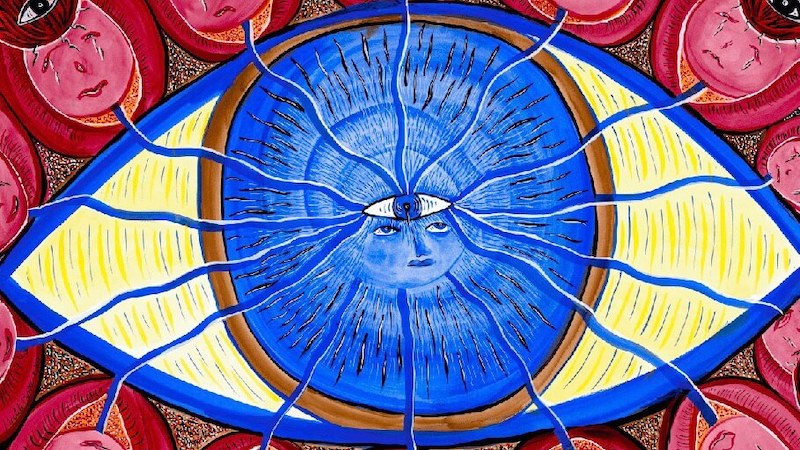
Can a paint brush stroke be a portal to yourself when you live inside the process… when you are truly open to that which lands on the canvas?
This is what I initially perceived when I first encountered the idea of “inhabiting” art, championed by Michele Cassou, American artist and founder of Point Zero Painting. Turns out, my initial perception had just scratched the surface.
“To inhabit art means to allow yourself to perceive and experience the many layers of life, and their spiritual aspects,” said Cassou. “It opens our eyes to the invisible and the unknown. The passion to discover develops, and the mystery of our worlds expands.”
In advance of her upcoming workshop, Cassou illuminated the Point Zero Method, how to unlock freedom, and what freedom means to her as an artist and human being.
Christine Chen: Can you describe the Point Zero Method?
Michele Cassou: Point Zero is a way of going beyond our cultural and personal conditioning. It is a way of moving always in the new, by reentering the present moment.
CC: What makes it different from other approaches, specifically for spiritual exploration?
MC: It is different from other approaches because it does not go into good and bad, success and failure, there is no agenda. Through spontaneity and pure intuition, we are led toward truth and reality.
CC: What surprises people most about the process?
MC: People are astonished by the unseen depth of their worlds, and their creative capacity to discover the unknown through painting.
CC: How does it unlock freedom?
MC: By letting pure intuition move their brush, painters learn to explore unknown dimensions and they touch the mystery of their lives. It unlocks freedom by developing a sense of infinite possibility.
CC: How might we experience freedom, unleashed, through this method?
MC: By letting go of fear and self-consciousness, we let go of the result and move into [the] process. It brings a sense of waking up and touching something we've always longed for.
CC: What does freedom mean to you?
MC: When we step outside of our conditioning and unlearn the rules, our perception and creation becomes more spontaneous and natural. Freedom of expression brings us to who we really are.
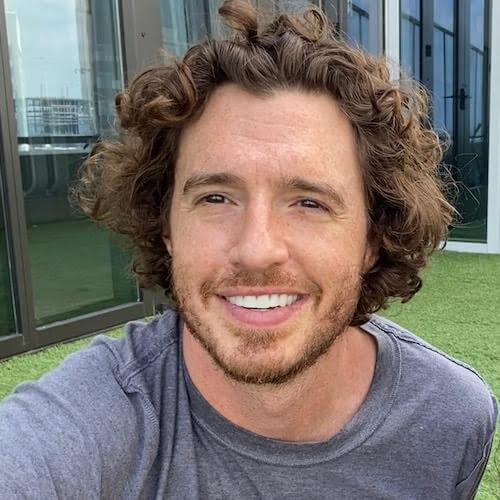
“Remembering to be as self compassionate as I can and praying to the divine that we're all a part of.”
–Aaron
“Prayer, reading, meditation, walking.”
–Karen
“Erratically — which is an ongoing stream of practice to find peace.”
–Charles
“Try on a daily basis to be kind to myself and to realize that making mistakes is a part of the human condition. Learning from our mistakes is a journey. But it starts with compassion and caring. First for oneself.”
–Steve
“Physically: aerobic exercise, volleyball, ice hockey, cycling, sailing. Emotionally: unfortunately I have to work to ‘not care’ about people or situations which may end painfully. Along the lines of ‘attachment is the source of suffering’, so best to avoid it or limit its scope. Sad though because it could also be the source of great joy. Is it worth the risk?“
–Rainer
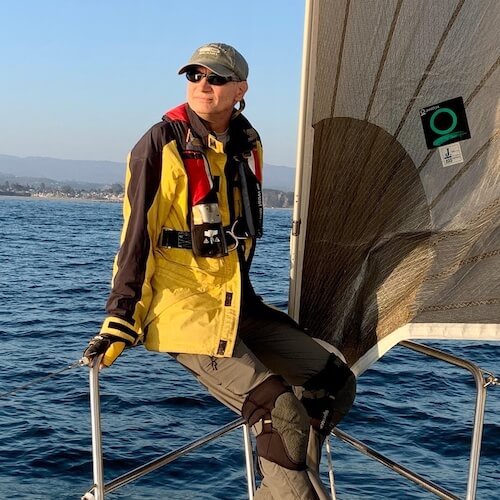

“It's time for my heart to be nurtured on one level yet contained on another. To go easy on me and to allow my feelings to be validated, not judged harshly. On the other hand, to let the heart rule with equanimity and not lead the mind and body around like a master.”
–Suzanne
“I spend time thinking of everything I am grateful for, and I try to develop my ability to express compassion for myself and others without reservation. I take time to do the things I need to do to keep myself healthy and happy. This includes taking experiential workshops, fostering relationships, and participating within groups which have a similar interest to become a more compassionate and fulfilled being.“
–Peter
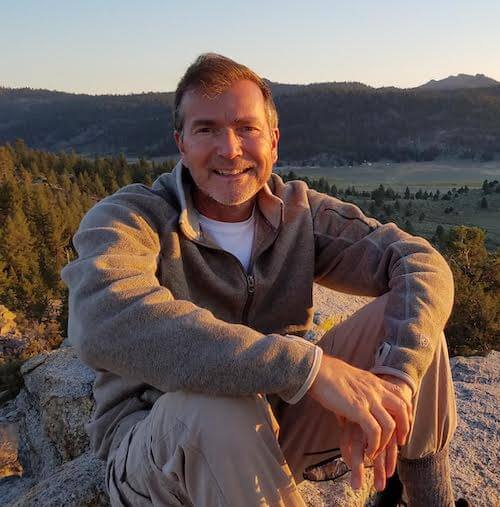
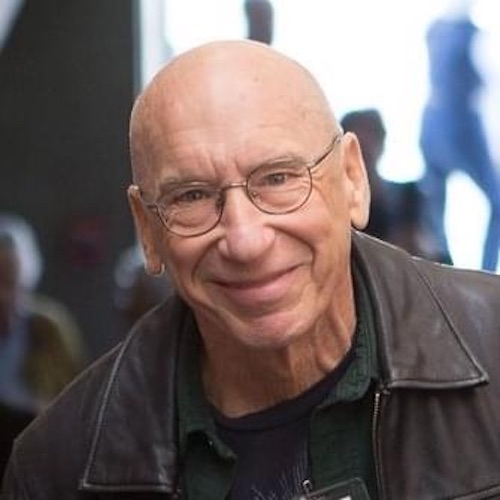
“Self-forgiveness for my own judgments. And oh yeah, coming to Esalen.”
–David B.
“Hmm, this is a tough one! I guess I take care of my heart through fostering relationships with people I feel connected to. Spending quality time with them (whether we're on the phone, through messages/letters, on Zoom, or in-person). Being there for them, listening to them, sharing what's going on with me, my struggles and my successes... like we do in the Esalen weekly Friends of Esalen Zoom sessions!”
–Lori

“I remind myself in many ways of the fact that " Love is all there is!" LOVE is the prize and this one precious life is the stage we get to learn our lessons. I get out into nature, hike, camp, river kayak, fly fish, garden, I create, I dance (not enough!), and I remain grateful for each day, each breath, each moment. Being in the moment, awake, and remembering the gift of life and my feeling of gratitude for all of creation.”
–Steven
“My physical heart by limiting stress and eating a heart-healthy diet. My emotional heart by staying in love with the world and by knowing that all disappointment and loss will pass.“
–David Z.
Today, September 29, is World Heart Day. Strike up a conversation with your own heart and as you feel comfortable, encourage others to do the same. As part of our own transformations and self-care, we sometimes ask for others to illuminate and enliven our hearts or speak our love language.
What if we could do this for ourselves too, even if just for today… or to start a heart practice, forever?
Michele Cassou’s workshop, The Painting Process Rediscovered: The Magic of Spontaneous Expression, is June 6-10, 2022.
Christine Chen is a two-time Emmy winning journalist, best-selling author, California native, and senior teacher of yoga and Ayurveda.

Can a paint brush stroke be a portal to yourself when you live inside the process… when you are truly open to that which lands on the canvas?
This is what I initially perceived when I first encountered the idea of “inhabiting” art, championed by Michele Cassou, American artist and founder of Point Zero Painting. Turns out, my initial perception had just scratched the surface.
“To inhabit art means to allow yourself to perceive and experience the many layers of life, and their spiritual aspects,” said Cassou. “It opens our eyes to the invisible and the unknown. The passion to discover develops, and the mystery of our worlds expands.”
In advance of her upcoming workshop, Cassou illuminated the Point Zero Method, how to unlock freedom, and what freedom means to her as an artist and human being.
Christine Chen: Can you describe the Point Zero Method?
Michele Cassou: Point Zero is a way of going beyond our cultural and personal conditioning. It is a way of moving always in the new, by reentering the present moment.
CC: What makes it different from other approaches, specifically for spiritual exploration?
MC: It is different from other approaches because it does not go into good and bad, success and failure, there is no agenda. Through spontaneity and pure intuition, we are led toward truth and reality.
CC: What surprises people most about the process?
MC: People are astonished by the unseen depth of their worlds, and their creative capacity to discover the unknown through painting.
CC: How does it unlock freedom?
MC: By letting pure intuition move their brush, painters learn to explore unknown dimensions and they touch the mystery of their lives. It unlocks freedom by developing a sense of infinite possibility.
CC: How might we experience freedom, unleashed, through this method?
MC: By letting go of fear and self-consciousness, we let go of the result and move into [the] process. It brings a sense of waking up and touching something we've always longed for.
CC: What does freedom mean to you?
MC: When we step outside of our conditioning and unlearn the rules, our perception and creation becomes more spontaneous and natural. Freedom of expression brings us to who we really are.

“Remembering to be as self compassionate as I can and praying to the divine that we're all a part of.”
–Aaron
“Prayer, reading, meditation, walking.”
–Karen
“Erratically — which is an ongoing stream of practice to find peace.”
–Charles
“Try on a daily basis to be kind to myself and to realize that making mistakes is a part of the human condition. Learning from our mistakes is a journey. But it starts with compassion and caring. First for oneself.”
–Steve
“Physically: aerobic exercise, volleyball, ice hockey, cycling, sailing. Emotionally: unfortunately I have to work to ‘not care’ about people or situations which may end painfully. Along the lines of ‘attachment is the source of suffering’, so best to avoid it or limit its scope. Sad though because it could also be the source of great joy. Is it worth the risk?“
–Rainer


“It's time for my heart to be nurtured on one level yet contained on another. To go easy on me and to allow my feelings to be validated, not judged harshly. On the other hand, to let the heart rule with equanimity and not lead the mind and body around like a master.”
–Suzanne
“I spend time thinking of everything I am grateful for, and I try to develop my ability to express compassion for myself and others without reservation. I take time to do the things I need to do to keep myself healthy and happy. This includes taking experiential workshops, fostering relationships, and participating within groups which have a similar interest to become a more compassionate and fulfilled being.“
–Peter


“Self-forgiveness for my own judgments. And oh yeah, coming to Esalen.”
–David B.
“Hmm, this is a tough one! I guess I take care of my heart through fostering relationships with people I feel connected to. Spending quality time with them (whether we're on the phone, through messages/letters, on Zoom, or in-person). Being there for them, listening to them, sharing what's going on with me, my struggles and my successes... like we do in the Esalen weekly Friends of Esalen Zoom sessions!”
–Lori

“I remind myself in many ways of the fact that " Love is all there is!" LOVE is the prize and this one precious life is the stage we get to learn our lessons. I get out into nature, hike, camp, river kayak, fly fish, garden, I create, I dance (not enough!), and I remain grateful for each day, each breath, each moment. Being in the moment, awake, and remembering the gift of life and my feeling of gratitude for all of creation.”
–Steven
“My physical heart by limiting stress and eating a heart-healthy diet. My emotional heart by staying in love with the world and by knowing that all disappointment and loss will pass.“
–David Z.
Today, September 29, is World Heart Day. Strike up a conversation with your own heart and as you feel comfortable, encourage others to do the same. As part of our own transformations and self-care, we sometimes ask for others to illuminate and enliven our hearts or speak our love language.
What if we could do this for ourselves too, even if just for today… or to start a heart practice, forever?
Michele Cassou’s workshop, The Painting Process Rediscovered: The Magic of Spontaneous Expression, is June 6-10, 2022.

Can a paint brush stroke be a portal to yourself when you live inside the process… when you are truly open to that which lands on the canvas?
This is what I initially perceived when I first encountered the idea of “inhabiting” art, championed by Michele Cassou, American artist and founder of Point Zero Painting. Turns out, my initial perception had just scratched the surface.
“To inhabit art means to allow yourself to perceive and experience the many layers of life, and their spiritual aspects,” said Cassou. “It opens our eyes to the invisible and the unknown. The passion to discover develops, and the mystery of our worlds expands.”
In advance of her upcoming workshop, Cassou illuminated the Point Zero Method, how to unlock freedom, and what freedom means to her as an artist and human being.
Christine Chen: Can you describe the Point Zero Method?
Michele Cassou: Point Zero is a way of going beyond our cultural and personal conditioning. It is a way of moving always in the new, by reentering the present moment.
CC: What makes it different from other approaches, specifically for spiritual exploration?
MC: It is different from other approaches because it does not go into good and bad, success and failure, there is no agenda. Through spontaneity and pure intuition, we are led toward truth and reality.
CC: What surprises people most about the process?
MC: People are astonished by the unseen depth of their worlds, and their creative capacity to discover the unknown through painting.
CC: How does it unlock freedom?
MC: By letting pure intuition move their brush, painters learn to explore unknown dimensions and they touch the mystery of their lives. It unlocks freedom by developing a sense of infinite possibility.
CC: How might we experience freedom, unleashed, through this method?
MC: By letting go of fear and self-consciousness, we let go of the result and move into [the] process. It brings a sense of waking up and touching something we've always longed for.
CC: What does freedom mean to you?
MC: When we step outside of our conditioning and unlearn the rules, our perception and creation becomes more spontaneous and natural. Freedom of expression brings us to who we really are.

“Remembering to be as self compassionate as I can and praying to the divine that we're all a part of.”
–Aaron
“Prayer, reading, meditation, walking.”
–Karen
“Erratically — which is an ongoing stream of practice to find peace.”
–Charles
“Try on a daily basis to be kind to myself and to realize that making mistakes is a part of the human condition. Learning from our mistakes is a journey. But it starts with compassion and caring. First for oneself.”
–Steve
“Physically: aerobic exercise, volleyball, ice hockey, cycling, sailing. Emotionally: unfortunately I have to work to ‘not care’ about people or situations which may end painfully. Along the lines of ‘attachment is the source of suffering’, so best to avoid it or limit its scope. Sad though because it could also be the source of great joy. Is it worth the risk?“
–Rainer


“It's time for my heart to be nurtured on one level yet contained on another. To go easy on me and to allow my feelings to be validated, not judged harshly. On the other hand, to let the heart rule with equanimity and not lead the mind and body around like a master.”
–Suzanne
“I spend time thinking of everything I am grateful for, and I try to develop my ability to express compassion for myself and others without reservation. I take time to do the things I need to do to keep myself healthy and happy. This includes taking experiential workshops, fostering relationships, and participating within groups which have a similar interest to become a more compassionate and fulfilled being.“
–Peter


“Self-forgiveness for my own judgments. And oh yeah, coming to Esalen.”
–David B.
“Hmm, this is a tough one! I guess I take care of my heart through fostering relationships with people I feel connected to. Spending quality time with them (whether we're on the phone, through messages/letters, on Zoom, or in-person). Being there for them, listening to them, sharing what's going on with me, my struggles and my successes... like we do in the Esalen weekly Friends of Esalen Zoom sessions!”
–Lori

“I remind myself in many ways of the fact that " Love is all there is!" LOVE is the prize and this one precious life is the stage we get to learn our lessons. I get out into nature, hike, camp, river kayak, fly fish, garden, I create, I dance (not enough!), and I remain grateful for each day, each breath, each moment. Being in the moment, awake, and remembering the gift of life and my feeling of gratitude for all of creation.”
–Steven
“My physical heart by limiting stress and eating a heart-healthy diet. My emotional heart by staying in love with the world and by knowing that all disappointment and loss will pass.“
–David Z.
Today, September 29, is World Heart Day. Strike up a conversation with your own heart and as you feel comfortable, encourage others to do the same. As part of our own transformations and self-care, we sometimes ask for others to illuminate and enliven our hearts or speak our love language.
What if we could do this for ourselves too, even if just for today… or to start a heart practice, forever?
Michele Cassou’s workshop, The Painting Process Rediscovered: The Magic of Spontaneous Expression, is June 6-10, 2022.
Christine Chen is a two-time Emmy winning journalist, best-selling author, California native, and senior teacher of yoga and Ayurveda.